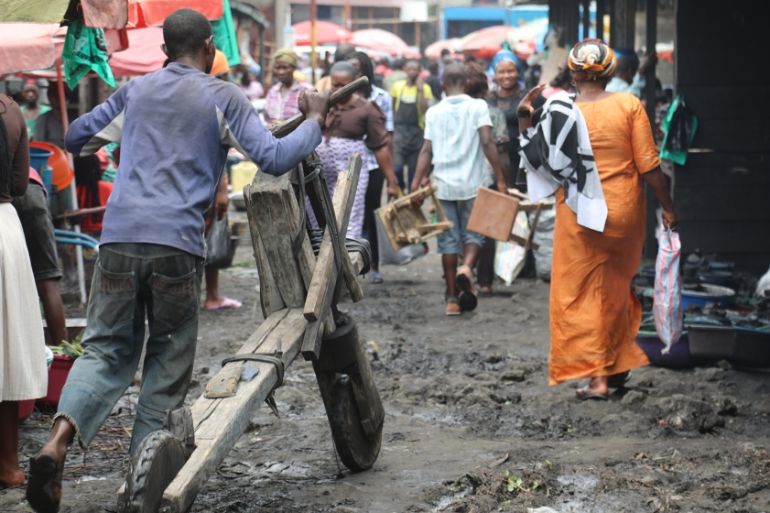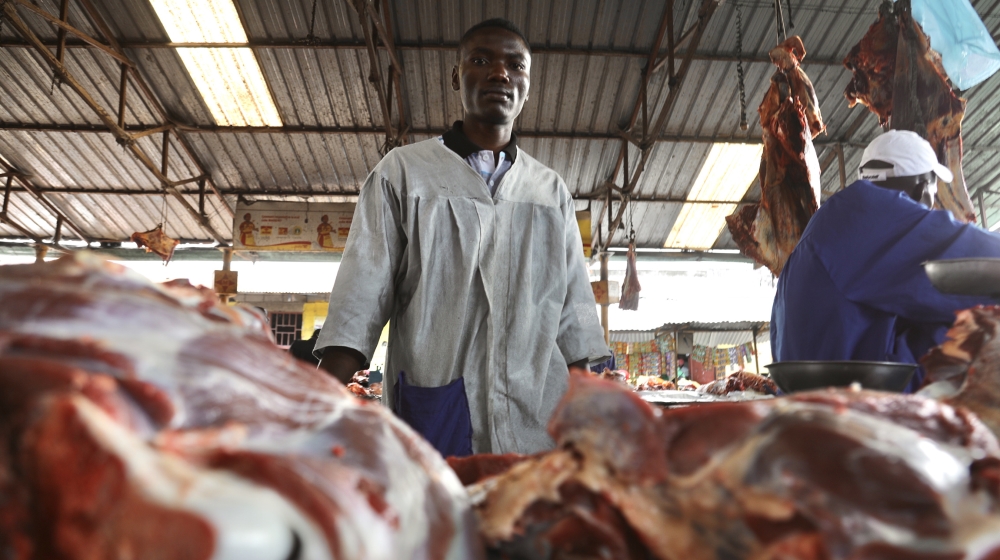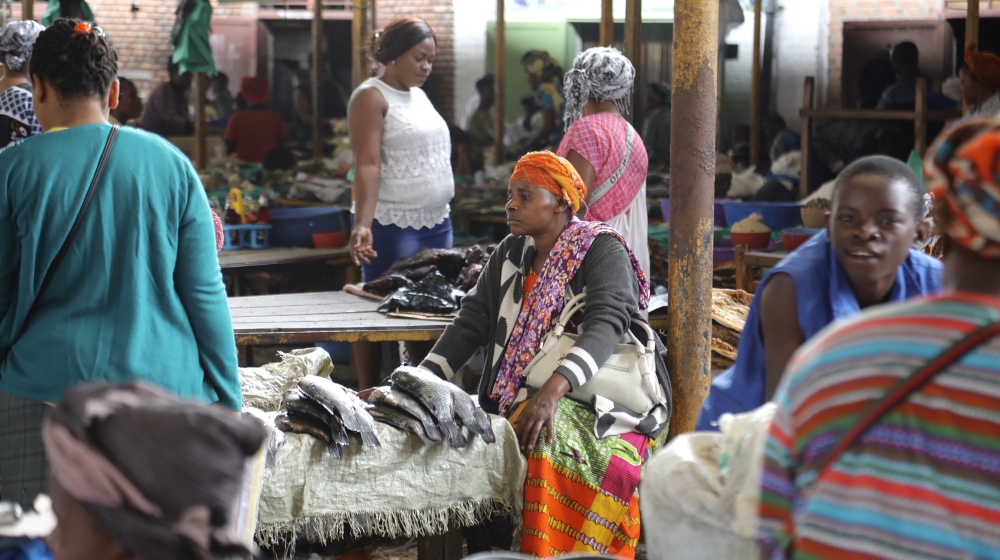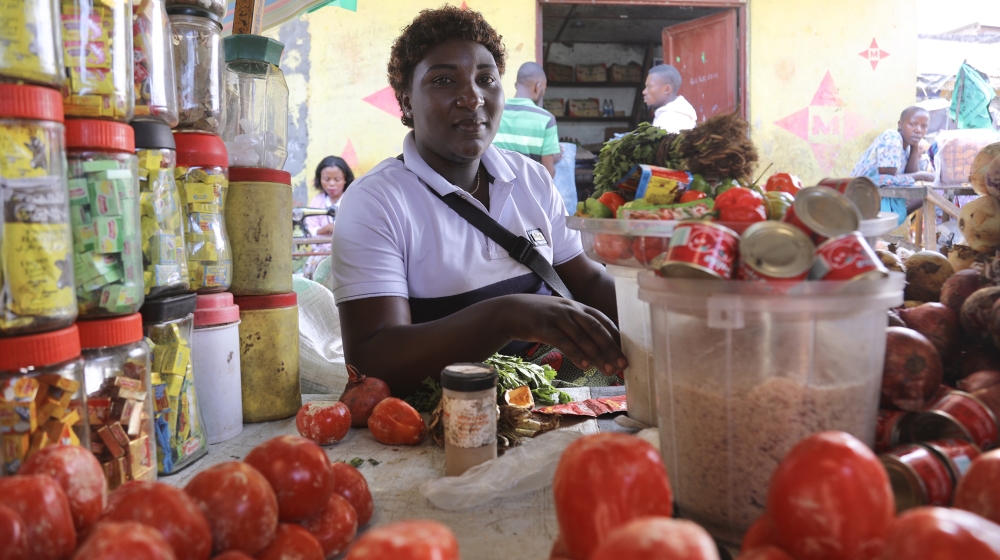‘Life now is so difficult’: Food prices rocket amid DRC lockdown
Residents in Goma feel the strain as coronavirus-related restrictions heap further pressure on the economy.

Goma, the Democratic Republic of the Congo – Swarms of black flies cover a festering slab of meat on Patrick Bwira’s stall in Goma’s sprawling Virunga market. Business for the 21-year-old butcher has dried up dramatically as a lockdown imposed in the city due to the coronavirus pandemic has ramped up pressure on the economy and seen food prices rocket.
“It’s very difficult,” said Bwira. “For now, I only just scrape enough money to eat. But no more than that – I can’t afford to do anything else in my life.”
Keep reading
list of 3 items‘I heard the cries of my mother and sister being raped’
Analysis: DRC’s deadly, but ignored, measles epidemic
For Bwira, the wholesale price for a small cut of beef has risen by a third, up to 8,000 Congolese francs ($4.66), all but wiping out his meagre daily earnings.
“I can’t go on like this,” he said.
Several people interviewed by Al Jazeera at the two-hectare hub of wooden stalls selling fresh food and clothing painted a picture of stagnation. In one section, the lower footfall had left stacks of large tomatoes to rot and mounds of multicoloured beans to dry and crack; in another, traders were left with barely any produce to sell due to the cut-off supply.

Jimba Kitungu, 54, said the price of cassava flour – usually brought in from neighbouring Rwanda, but now limited because of border restrictions – had doubled in a matter of weeks. It has put a serious financial strain on the mother of 12 children.
“What if I cannot feed them?” she said. “I will have to steal.”
Prices jump
Since last Monday, the eastern city of Goma – along with the capital, Kinshasa, and a number of other cities in the Democratic Republic of the Congo (DRC) – has been under lockdown in order to slow the spread of COVID-19, the highly infectious respiratory disease caused by the new coronavirus.
No entry or exit is permitted, and key internal routes such as the road between Goma and Bukavu have been closed to normal traffic. Meanwhile, neighbouring countries including Burundi, Rwanda and Uganda have closed their borders
The restrictions are heaping further pressure on the economy at a time when there has already been a loss of economic activity and an increase in the prices of basic necessities, eroding the purchasing power of inhabitants.
Figures published on Friday by research initiative Kivu Security Tracker show the price of food staples in Goma has risen significantly since borders were closed in recent weeks due to the pandemic. The cost of salt has increased by 88.9 percent, oil by 57.9 percent, hand sanitzer by 66 percent and potatoes by 50 percent, according to the research.
“A large part of the trade in the region is done by small traders who [need to] physically move with their products,” the report said, citing World Bank figures that show the urban informal sector represented 81.5 percent of the DRC’s jobs in 2012. “The crisis has therefore already led to the loss of these economic activities.”

The wider effect of the coronavirus pandemic on the Congolese economy is set to be dire.
On Wednesday, the International Monetary Fund said sub-Saharan Africa – home to some of the world’s fastest-growing economies – is facing a severe downturn, and ominously warned that “no country will be spared”.
According to a World Bank report, the region will this year suffer its first recession for 25 years, while its economy could shrink by as much as 5.1 percent in 2020 from a growth of 2.4 percent last year because of a fall in commodity prices and the effect on Africa’s key trading partners.
As a result, almost half of all African jobs could be lost with an expected income shortfall of $220bn in developing countries, the UN Development Programme said.
“We were already expecting Congolese growth to slow,” said Jane Morley, head of the sub-Saharan Africa risk team at Fitch Solutions. “Chances are this will now be much more pronounced.”
Demand for copper, which accounts for about 38 percent of the DRC’s exports, is “likely to slow given more muted growth in China and other key markets”, according to Morley, with mining considered “high-risk” in terms of the coronavirus. The imposition of a state of emergency and travel limitations are also likely to affect consumer spending and corporate investment in the DRC, she added.

‘We need someone to help us’
Although Africa is some way behind other continents in terms of confirmed coronavirus cases, numbers have risen sharply to more than 17,000. The DRC, which recorded its first on March 10, now has 254 confirmed cases and 21 deaths, according to the National Institute for Biomedical Research.
On April 2, the World Bank pledged $47m to fund the emergency response in the DRC, with a focus on containing the spread of COVID-19.
Yet experts anticipate revenues to collapse as commodity prices plummet, international trade to drop and remittances from relatives abroad – last year $49bn was sent home by Africans in the diaspora – to greatly reduce.
The international community has made some efforts, with the IMF on Monday passing a $500m package of debt relief for 25 countries including the DRC.
But with the vast central African country unable to introduce social welfare reforms – as seen across the developed world – it may not be enough.
Back at the Virunga market in Goma, two customers walk away from Francine Pacif’s stall on hearing the increased price of her peanuts.
They are now brought in from the central province of Kasai, some 1,000km (621 miles) away, and cost two-thirds more than before.
“Life has become very difficult,” Pacif, 50, said. “We need someone to help us.”
This reporting was supported by The Pulitzer Center